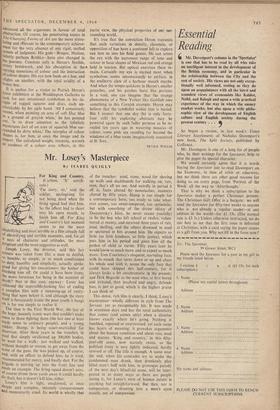Mr. Losey's Masterpiece
By ISABEL QUIGLY For King and Country. (Carlton, 'X' certifi- cate.)
Joseph Losey, the director, said this last minute was taken from life; a man so dutiful, so humble, so simple, or so much conditioned to duty, humility and simplicity, actually apolo- gised for giving his executioners the bother of finishing him off. Or could it have been irony, the more ferocious for being in the moment of death? Not in this case, anyway:- Losey has achieved" the impossible-looking feat of ending a complex film with a summing-up of every- thing that went before it, and although the story itself is ferociously ironic the poor youth it hangs on is far too simple to realise it. The time is the First World War, the last of the huge, insanely ironic wars that couldn't make sense to those fighting them (the last one at least Made sense to ,ordinary people), and a young soldier, Hamp, is being court-martialled for desertion. After three years in the trenches, in Mud that simply swallowed up 300,000 bodies, he went for a walk : just walked and walked, Without thought or reason; to get away from the noise of the guns. He was picked up, of course; and, with an officer to defend him, he is tried, recommended for mercy, and finally shot. For the brigade is moving up into the front line and needs an example. The firing squad doesn't miss, of course (from three yards away it could hardly .do that), but it doesn't kill him, either.
Losey's film is tight, unadorned, at once simple and complex, intensely compassionate and momentarily cruel. Its world is wholly that
of the trenches: mud, stone, wood for shoring up walls and duckboards for walking on, rats, men, that's all we see. And weirdly in period it all is, faces altered by moustaches, manners altered by fifty years. Hamp is too simple for a contemporary hero; too ready to take what- ever comes, too sweet-tempered, too optimistic; but with something of the divine idiocy of Dostoievsky's Idiot, he never ceases (socially) to be the boy who left school at twelve, volun- teered at twenty, and survived three years of rats, mud, shelling, and the others drowned in mud or spattered in bits around him. He expects so little (so little kindness, so little justice), which puts him in his period and gives him all the pathos of child or victim. Fifty years later he would know so much more, and so expect so much more. Tom Courtenay's eloquent, starveling face, with its mouth that turns down or up and alters his whole soul with it, seems the only face that could have skipped this half-century, for it always looks a bit anachronistic ig the present; and Dirk Bogarde as the man who, at first bored and irritated, then involved and angry, defends him, is just as good, which is the highest praise I can think of.
This dense, rich film is clearly, I think, Losey's masterpiece—wholly different in style from The Servant, yet as recognisably his. It was made in seventeen days and has the total authenticity that comes (and comes only) when a director knows exactly where he's going. Nothing is fumbled, repeated or overstressed, yet each scene has layers of meaning; it provokes arguments about the human condition and about rats, mud and mutiny. 'King and country,' in this fifty- year-old sense, now scarcely exists, so the political irony is very lightly indicated, hardly stressed at all. The title is enough. A scene near the end, when his comrades try to make the condemned man drunk, then drunkenly play blind man's buff with him, in grotesque parody of the next day's blindfold scene, will be inter- preted in as many ways as there are people seeing it„ for Losey's view of human nature is anything but straightforward. But then, nor is compassion, or shooting into a man's open mouth, out of compassion.


































 Previous page
Previous page